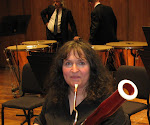A day off from symphony services does not mean that I also have a day off from the bassoon! That's because of the embouchure. (The embouchure is the use of facial muscles and the shaping of the lips around the reed or mouthpiece of a wind instrument. The word is of French origin and is related to the root bouche,"mouth.") The embouchure has to be carefully maintained- even one day of not playing makes a noticeable difference. Like any other set of muscles in the body, the muscles associated with embouchure can be either well-exercised and strong, or ignored and atrophied. I don't like to lose control of my embouchure. If its muscles are weak, I lose control- my embouchure just gives out after a certain amount of playing. I don't know how that phenomenon presents itself on other instruments, but on the bassoon, it means that intonation goes out the window. Tone quality suffers as well.
Thus, a day off from symphony services means that I still practice. Usually there is a program on the horizon for which I'll start preparing, but my favorite day off practicing is done without any printed music. This is especially valuable now, because I'm getting used to a new bassoon. I usually start with some sort of scale work, extended to cover the entire range of the bassoon, focused on intonation, tone quality, and smoothness. Also, scales are great for overcoming the natural tendency of the bassoon to decrescend as the the scale rises (opposite of other instruments).
I like to turn my chair so that I am able to look out the window during scales- I want the scales to be automatic, and the distraction of looking out the window helps with that. This doesn't mean that I stop listening, though- the same as with regular practicing, if there is a lack of smoothness in any transition from one note to the next, it's necessary to stop, isolate the problem and iron it out. The same applies to intonation. My bassoon is brand new, and it will take a very long time (years!) to break in. It's constantly changing. The amount of embouchure and air pressure which caused a note to play in tune last week might be different this week!
I practice more in the extreme high range than in any other part of the instrument. Sometimes I'll practice scales in the extreme high range only. The reason I do this is because we bassoonists are seldom called upon to play in the high extremities, and therefore we don't spend much time up there. Then, when we are called upon play up there, it's hit or miss- the notes may or may not come out, and when they do, they may not be in tune, and transitioning from note to note is awkward. The obvious solution is to spend lots of time practicing up there so that the high range is familiar!
After scale work, I move on to vibrato. Lately I have been using an exercise which I remember hearing my flutist friends practicing at Eastman. I think they said it was an exercise developed by the famous flute master Marcel Moyse- it involves long tones, with vibrato, two notes at a time. The first note is a half step higher than the second, and the phrase of 2 notes begins pp, senza vibrato, with a big crescendo, vibrato increasing, as the first note transitions into the second, and the 2 note phrase ends with a decrescendo to nothing. I like the challenge of making my vibrato sound like a flutist's vibrato, with clarity and varying intensity. This exercise is a great embouchure builder. Sometimes at the end of this exercise, I play improvised melodies, paying close attention to the vibrato. Usually I then add a few phrases from upcoming concerts- there are always certain intervals or exposed passages to work on obsessively! Still, I keep my policy of no music- even the detailed work on upcoming symphony music has to be from memory.
My day off practicing routine not only maintains embouchure- it promotes familiarity with the instrument. Do you ever feel "out of touch" with your instrument, when you have trouble "placing" notes at their correct pitches? I have noticed that sometimes I feel out of touch with the instrument as a whole when I have had to spend a disproportionate amount of time focused on one specific program. I can be playing each passage in that program at an acceptable level, but my global familiarity with the instrument can still be off! There are days when I choose not to practice, so that my embouchure remains fresh for rehearsals or concerts in that same day. I think that orchestral players can easily fall into the trap of becoming narrowly focused on only the material being performed. The solution to that problem is the "familiarity" practicing which I am describing here-even if you can't do it every day due to embouchure-saving for rehearsals and concerts.
I often conclude these "familiarity" (or "embouchure building") practice sessions with a movement of a Bach cello suite or an etude of some sort (with printed music!). It's so valuable to play extensive pieces like this instead of just narrowing the focus onto a few brief exposed passages of orchestral literature. It's fine (and necessary) to practice and prepare the orchestral music, but there's so much more business to attend to if one's goal is to master an instrument!
And The Operas Are …
-
I had Das Rheingold, but that’s not a big surprise since I’d read about the
Ring Cycle coming in 2028 But the others? Well, I might have guessed the
Mozart...
13 hours ago













